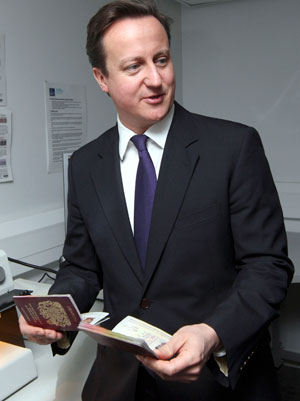Immigration: the latest political bogeyman
As the coalition caps Non-EU migrants and the “overwhelming public concern” about immigration reaches the Commons, Gaby Hinsliff writes that the perennial bogeyman of British politics is back.

Poor old Ireland: a “friend in need”, but apparently not the kind of friend we want turning up at home. Defending his part in the EU bailout, David Cameron suggested this week it could prevent “a huge impact on Irish people coming to the UK for work” – in other words, an influx of economic migrants.
The perennial bogeyman of British politics is back: the last week alone saw a backbench debate on “overwhelming public concern” about immigration, a coalition cap on non-EU immigration, and a pamphlet from the Institute for Public Policy Research arguing Labour didn’t discuss immigration enough.
According to ex-immigration minister Phil Woolas – expelled as a Labour MP for falsely claiming his election opponent had wooed Muslims – Labour “imposed a gag on ourselves” on the issue. Immigration is becoming the fashionable answer to the question of what went wrong for Labour.
On doorsteps and in focus groups, anti-immigrant grumbles are unmistakable. Cheap Polish plumbers were a boon to the kitchen-extending classes, but not the ‘squeezed middle’ earners competing with them for work.
Yet detailed research like the TUC’s 2009 report Unfair to Middling offers a more complex explanation for these middle earners’ pain, citing employers failing to increase wages in line with rising productivity over many years. Immigrants make easy scapegoats, but life’s not always that simple.
The shadow cabinet should remember that on their recently announced ‘listening tour’ of the electorate. Because the trouble is politicians tend to listen like dogs do.
Politicians should listen. But they shouldn’t always trust their own ears.
Talk to your pet, and it will often feign rapt attention. But since most of what you say is meaningless noise to a dog, it’s really only scanning for the odd familiar word (usually “dinner”).
When William Hague staged his 1998 Listening to Britain tour to find out what had gone wrong for the Conservatives, he latched onto a familiar word amid the din: “Europe”. Similarly, Labour is now mostly hearing “immigration” and “rich people”.
But as Hague’s 2001 defeat proved, what makes people angry doesn’t necessarily make them vote. As Cameron realised in 2005, loudly articulating popular grievances may matter less than being liked and trusted to fix whatever grievances arise.
Politicians should listen. But they shouldn’t always trust their own ears.
Gaby Hinsliff is former Political Editor of the Observer.
-
Latest news
-
Ex-Trump lawyer Michael Cohen testifies at hush money trial3m

-
Racial hate speech laws being ‘weaponised’ warns National Black Police Association7m

-
‘Hard to believe so many women going through such horrors’, says woman whose baby daughter was stillborn8m

-
Damning report condemns ‘shockingly poor’ UK maternity services12m

-
People ‘expecting the West to stand by Georgia’, says opposition party leader5m

-




